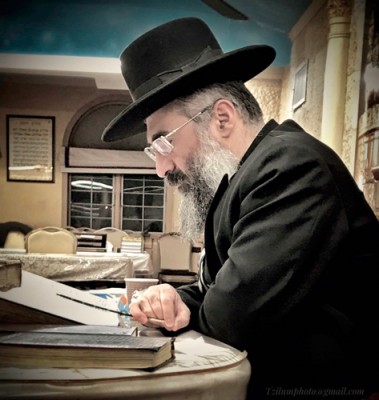
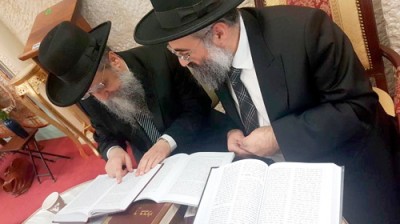
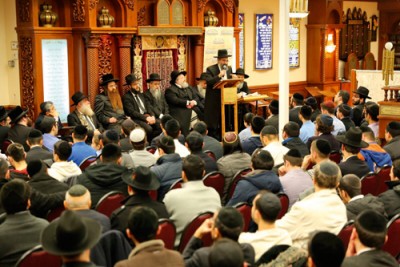
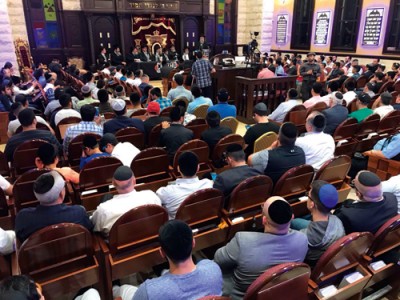
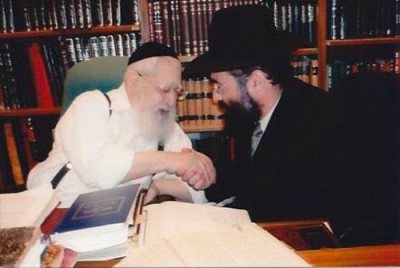
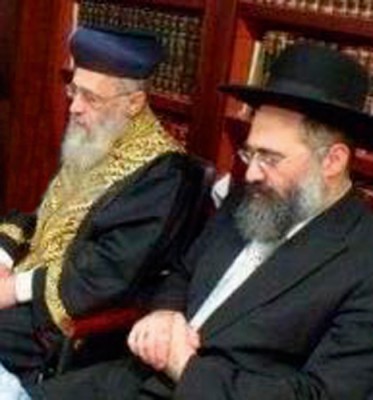
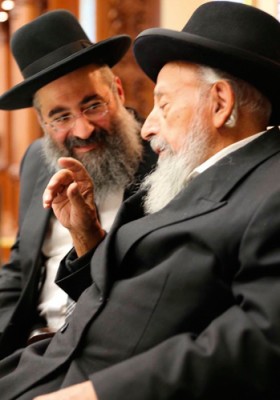
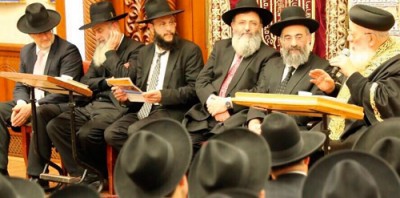
Interviewing Rav Yitzchak Yisraeli;
The Chief Rabbi of Bukharian Jewry in USA and CanadaJohn F. Kennedy once said, “Ask not what your country can do for you; ask what you can do for your country.” Kennedy’s famous remark hit a chord, specifically because it refocused public ethos. Are you a taker or a giver? Do you contribute to society or is your relationship merely about the “self”? A true leader is judged by a similar metric. He/she is more than self-interested; he/she has a foundational desire to improve the lives of others. From a Jewish perspective, the role of a leader must be to guide a nation forward in the path of the Torah. The Jewish leader represents and is responsible for the collective whole.
To be successful, a Jewish leader must have superior command of the Torah’s ultrafine legal doctrine and social tradition. I once attended a large gathering celebrating this very quality, for which the late Chacham Ovadia Yosef was known for. At the event, his son, Rav David Yosef, was given the honor of speaking about his father. I remember vividly, as the entire crowd watched, how Rav David Yosef was called up to the podium, but he refused to speak until Bukharian Chief Rabbi Yitzchak Yisraeli was given the opportunity to speak first. At the time, I was unaware of the reason for such odd behavior, but I was later to discover that Rabbi Yisraeli was not only a close friend of the Yosef family, but a bona fide student of the late Chacham Ovadia Yosef. As a writer, I am therefore especially pleased to present an interview of the Chief Rabbi of the Bukharian Community in the USA and Canada, Rabbi Yitzchak Yisraeli.
BJL: Hello, Rabbi – thank you for agreeing to be interviewed. Please tell us a little about your background. Where did you grow up? Which academies did you attend, and which rabbis influenced you most?
Chief Rabbi Yisraeli: I had the privilege to be born and raised in the Holy City of Jerusalem, into a family of great Torah scholars. The first yeshiva I attended was Sukkat David, a prominent Sephardic institution. After my elementary education, I attended a very advanced program in Yeshivat Tifrach, headed by Rabbi Friedman and Rabbi Eliezer Piltz. Back in my day, the Yeshiva had about eighty students. Today, it boasts over 1,000 students! The yeshiva is located in southern Israel, in between the cities of Netivot and Be’er Sheva.
Throughout the time that I was in Jerusalem, before and after I attended Yeshivat Tifrach, I had the tremendous merit to learn with Maran Chacham Ovadia Yosef, of blessed memory. Anyone that knew Chacham Ovadia personally was awed by his tremendous knowledge in Torah. He literally mastered everything he studied. The classes I attended were very deep and methodical. The level of legal analysis, back then, was more rigorous than what people are aware of. He decreased the complexity of his classes in his later years, because he delivered them for general audiences. But when we came to learn with him back when I was younger, the level of each presentation was extremely deep.
I also had the opportunity to learn with Chacham Ovadia’s colleague, Chacham BenTzion Abba Shaul. He was also a genius in Torah whose blessings were very powerful. I picked up from both of them the method with which to deal with halachic inquiries. In truth, I witnessed not only their methods of legal analysis, but also, perhaps more importantly, their method of interaction with community members. I can share with you a nice story as an example:
A pregnant lady once came crying to Chacham BenTzion. She was distraught because a sonographer identified a deformed baby with three legs at her most recent visit. She was hysterical as she told over her story, but the Rav seemed to be smiling. When she realized his unexpected reaction, she asked him why he was smiling. Chacham BenTzion simply responded, “four legs.” She cried even harder until he told her, “You misunderstood. You have two babies; one is hiding behind the other and the sonographer only picked up one extra leg. Go check again.” The woman immediately returned for another appointment with the doctor and the Rabbi’s words were confirmed: She was indeed carrying twins!
BJL: Truly a remarkable story! When did you arrive in America and how did you become so acquainted with the Bukharian community?
Chief Rabbi Yisraeli: I came to these shores about nineteen or twenty years ago. I received a position by Rabbi Ben-Haim, given the task of teaching Bukharian students. The boys I met unfortunately didn’t have a real ability to learn Torah in Russia, and I had the opportunity of teaching them and helping develop their skills. The group of students actually included many of the rabbis serving the Bukharian community today.
About ten years ago, I began my second position in the Bukharian community as Rosh Kollel (head of the academy) for Rabbi Haimoff’s Yeshiva. There, I taught even more of the young men who eventually became leading rabbis in the community and are inspiring our future generations. My next position was as head of my current academy, Beth Gavriel, where once again I am charged with the task of building and guiding young rabbis. Throughout these years, I developed the personal relationships that allow me to connect with all the current Bukharian rabbis. But more importantly, I also established strong Torah connections with my students, which are actually stronger than your average relationships. A business relationship can be dissolved, just like any friendship can be broken. A true Torah relationship, however, lasts forever, as a solid connection.
BJL: I was told that you had a similar relationship with Chacham Ovadia Yosef. Although you touched upon it earlier, can you please elaborate on that for our readers?
Chief Rabbi Yisraeli: The truth is that my father was a student of Chacham Ovadia and continued learning with him after Chacham Ovadia became Chief Rabbi of Israel in 1973. During that time, Chacham Ovadia quoted my father the verse, “…and Yosef was sold as a slave.” Meaning, Chacham Ovadia truly felt that his position as Chief Rabbi was likened to being a slave. Being Chief Rabbi was a means to serve and guide more people not a means of getting honor and fame. He lived the Torah day and night and viewed his position as a responsibility to influence more people with the Torah.
As I mentioned earlier, I merited learning with Chacham Ovadia as well. Our families were and still are well acquainted with each other. During my years with Chacham Ovadia, it was not unusual for us to spend quite some time discussing certain legal doctrines or fine points of the halachah. He guided me through many topics and helped me resolve many issues. He truly was my guide and mentor, in every sense of the words. Even today, I follow his path in halacha and I am still very involved with his family, discussing and debating fine points of the law
with them.BJL: What is the vision behind your position as Chief Rabbi of the Bukharian community?
Chief Rabbi Yisraeli: As Chacham Ovadia’s student, I want to continue his mission of spreading Torah and unifying the halachah. In this sense, I see this position as a great responsibility, not a privilege. I want to make sure that the Torah is the heritage of not just a small part of Bukharian Jewry, but the entire Bukharian community. We are going to try to do this as much as we can with great love and dedication.
I can proudly say that a lot of the organizational work you see today in the community in trying to maintain the Jewish identity of our youth is connected to the Chief Rabbinate’s office and our rabbinical body. They work day and night to transfer public school children to yeshivot and to also send out “ambassadors” to reignite the souls of our lost brothers and sisters, those who lost a connection to their roots.
People must realize that the Bukharian heritage is very rich. Before communist Russia, the Bukharian community was mostly very respectful to a Torah way of life. They maintained a high level of Jewish education and were Torah observant Jews. After communism, many lost their connection to Judaism because they no longer had the opportunity to study. Communism looked to destroy our Jewish sprit and, to a certain degree, they succeeded. But look at the families who eventually made their way to Israel after the dissolution of Soviet Russia – so many of them fully recuperated their Judaism. And look at the revolution here in America. With education people are returning to their roots. In fact, I actually grew up in the Shechunat HaBukhori (Bukharian quarter) in Jerusalem and saw the revolution there as well.
BJL: So you grew up within the Bukharian community in Israel and then you eventually became involved with them here in America?
Chief Rabbi Yisraeli: Yes. I grew up in the Bukharian quarter of Jerusalem and was involved with them here in America since I first arrived. I have been connected with the Bukharian community all my life, and in truth I see it clearly as hashgahah (Providence). I did not ever decide “I will involve myself with this community,” but the majority of the time I was involved in one capacity or another.
I used to give shiurim Tuesday nights in Beth Gavriel about eighteen years ago. A young Israel Itshakov used to bring in boys from the streets and they would come and sit in these halachah classes. Do you know how many boys were saved? How many souls restored? Even some of the young leaders we have today came from those streets – from a desert with no Torah, and look what we have today!
BJL: There is no doubt that the roots planted back then truly influence the broader community today. You witnessed all of this growth occur over the years; how much has really changed?
Chief Rabbi Yisraeli: There has been a tremendous amount of growth in many factors. Firstly, look at all the young professionals we have in the community. From doctors to lawyers to pharmacists, we are living the American dream! And from a spiritual perspective, look at the shuls we had back then and their members in comparison to what we have today. Not only have the number of attendees increased, but their enthusiasm as well. The amount of Torah available, the level of understanding and depth – today you are living in a different world.
Furthermore, take the yeshivot we have today in the Bukharian community as another example. What did we have back twenty years ago? Today we have, Baruch Hashem, several yeshivot and hundreds upon hundreds of children learning. You will see in the coming years how this community truly blooms into full maturity, full self-sufficiency. We are working very hard to realize this dream, with G-d’s help.
BJL: Our community will depend on that success and we hope to continue seeing all the efforts bear fruit. At what point will you be able to look back and say that all you hoped for has come to fruition?
Chief Rabbi Yisraeli: The verse says, “then the knowledge of G-d shall cover the earth as the waters cover the sea.” We want everyone to have that connection with G-d and recognize Him. Every Jew who learns the Torah brings the ultimate redemption closer, as the Zohar states that Torah learning is what finally ushers in Mankind’s
Redemption.Furthermore, the Ohr Hahaim explains that the Exile in Egypt caused the Jews to nearly reach the point of no return. G-d pulled them out of the Exile before that point. But in our current exile, many Jews will have gone beyond the point of no return, to the level of absolute heresy, and yet the light of the Torah will find a way to bring us back. In Egypt we did not have the Torah. Today we have it, and want to spread its light far and wide for all to see. As Moshe taught us, Torah is our life and the length of our days. This is the dream we all want to come true, in our days.
BJL: That is beautiful. I only have one more question. The road to where you are now was not smooth – and it still isn’t. What advice do you have for our community members regarding the many exciting changes taking place? And how should they view and deal with the various modes of resistance that seem so obstinate?
Chief Rabbi Yisraeli: I have been involved in this community for approximately twenty years and it has actually been very smooth. However, when we worked to have unity and things were made public, the Yetzer Hara started to interfere. Things “covered from the eye” collect success; the opposite is true with publicity. The smaller successes go unnoticed specifically because they don’t “shake the cage” too much. But now when we are at the cusp of unparalleled growth and true change, resistance is to be expected. However, there is only a small voice trying to derail the prevailing unity and determination. Baruch Hashem, the great majority of the community rabbis and leaders are all on the same page and working together to build a stronger and brighter future. My words of encouragement are that we need to focus on growth, and not become distracted from our ultimate goal. The Chief Bukharian Rabbinate was formed with all the leaders of our community in order to spread the truth and help the community at large. We don’t need honor, fame or the like. We need to focus on working for the sake of the community and spreading the beauty of the Torah. We need to work on fighting the major issues with drugs and the high divorce rates. We must work hard and not be satisfied – that’s what it’s all about. Thank G-d the community is going in the right track, and we will continue to go strong!
After speaking with Chief Rabbi Yisraeli, it became obvious to me how lucky we are. Anyone can see how much our community has grown in the past decade. To think that there are dedicated people working day in and day out with the single goal of furthering that growth is truly heart-warming. We need more people in this community who work for the sake of its constituents. Those interested in studying with Chief Rabbi Yisraeli have the opportunity to join his classes every Monday night at Beth Gavriel, where he covers advanced topics in halachah. May we all merit to witness a truly unified generation ever-increasing with the knowledge of G-d.
A Great Leader in our Midst
Typography
- Smaller Small Medium Big Bigger
- Default Helvetica Segoe Georgia Times
- Reading Mode



